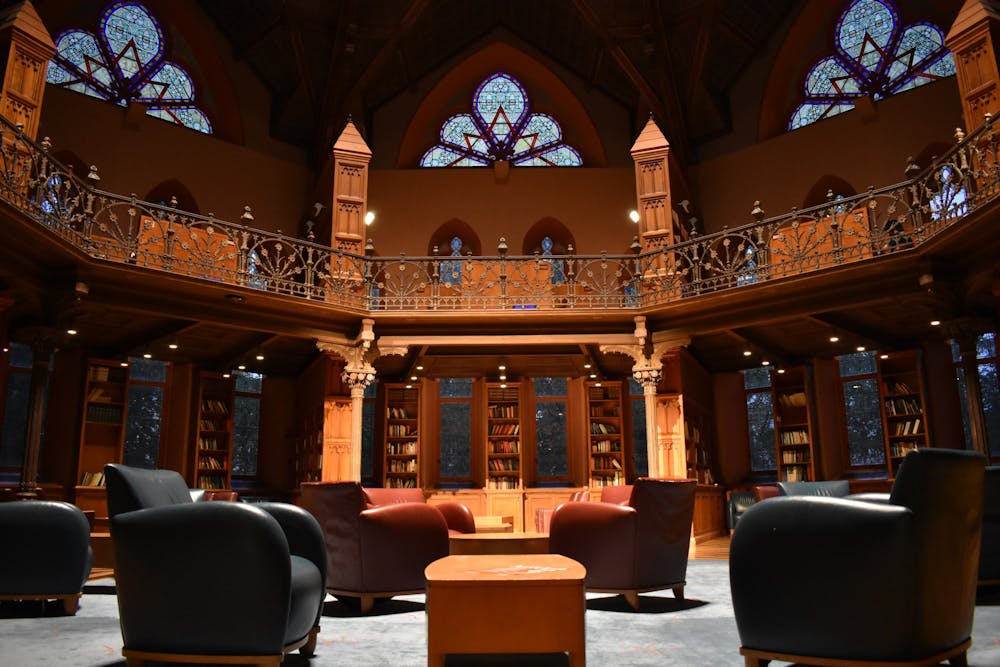This year’s Pre-read, “How to Stand up to a Dictator: The Fight for Our Future,” by Maria Ressa ’86, argues that defending democracy requires no less than a transformation in how liberal societies engage in discourse — not simply specific policy prescriptions or direct action-based activism. Ressa’s call for open discourse should be resonant on a campus where free speech is considered core. Each of us must work to build such an environment. As Ressa says, effective activism can only be preserved in environments that catalyze rigorous discussion and critical thought.
Should free exchange erode, the University community does not merely risk losing the educational value of speech, but also threatens to concede a critical pillar of free society altogether. We have to reclaim the mantle of free speech from right-leaning groups and ensure that free speech isn’t harmed by either institutional overreach or communal neglect.
The Foundation for Individual Rights and Expression (FIRE) recently released its controversial college free speech rankings for 2024. Contrary to its top spot in the Wall Street Journal rankings, Princeton ranked 187 out of the 248 universities evaluated. Yet, Princeton hardly feels like an institution where free speech is directly under attack. Speakers are not shouted down in lecture halls — the last vaguely relevant incident occurred in 2012 at a Goldman Sachs recruiting event —, nor is the University a place where free expression is challenged institutionally in the classroom. Instead, it is encouraged by the faculty’s ratification of a version of the Chicago Principles in 2015.
Although institutional programming — including free speech-related programming during first-year orientation in 2022 and 2023 — has demonstrated the University administration’s commitment to speech, it cannot be the only mechanism for invigorating discourse at Princeton. Without student engagement, the University’s commitments to free expression and its structured forums for speech are rendered meaningless. Not only are students failing to participate in bulwarking dissent and activist speech by putting the commitments into practice, but also pervasive complacency is allowing free speech to become an ideological issue. A mixture of perceived limits on expression and the reactionary hyper-politicization of speech on campus has created student disinterest in discourse.
Precisely because free speech is principally eroding from within, Princetonians cannot hope nor expect that institutional policymaking will solve real or perceived challenges to critical thought. Instead, students must take greater personal responsibility for ensuring continued freedom of expression, becoming less apathetic to the importance of campus discourse. Whether weighing in on local or global issues in formal or informal debates, Princetonians must bring difficult conversations that stimulate critical thinking into the fabric of collegiate life. Only active engagement can positively redefine the discussion — or lack thereof — of essential issues, rejecting the irrationality of ideology and the potential strictures of institutionality.
The question of free speech and expression at Princeton must be a nonpartisan and nonpolitical issue. Princetonians ought to fully realize the intrinsically liberal nature of critical discourse — and appreciate the dynamism it produces. Free speech, being the ultimate exercise of individual and political liberty, should bridge students across political divides. By embracing the marketplace of ideas, Princetonians can constantly test their ideas and those of others, creating a vigorous environment that defends worthwhile propositions, policies, and institutions while remaining capable of catalyzing change as necessary. In recent years, the debate on free expression at Princeton has been co-opted by campus conservatives as a rallying cry against supposed “threats” posed to campus discourse by the “illiberal left.” Complaints in the past about academic speech and expression, channeled from the Princeton Open Campus Coalition (POCC), the Princeton Federalist Society, and the Princeton Tory, have been met by meetings with administrators, including President Christopher Eisgruber.
The more conservative groups entrench themselves and frame the contours of the debate on free speech at Princeton, the more discourse suffers. The POCC’s views, whether questioning anti-racism’s role at Princeton to making overbroad claims about the ideological slant of the University, are toxic and polarizing for many Princetonians. While the POCC has an unquestioned right to participate vocally in campus discourse, it cannot persist as the lodestar for the reinvigoration of campus speech. By meeting campus conservatives on even ground — the classically liberal concept of free exchange — broad coalitions of students can reorient conversations and debates on free speech away from privileging political ends. If students start by situating free expression in a liberal context, individual engagement would restore and enliven the marketplace of ideas on campus, enabling a fuller appreciation for the dynamic, invigorating, and fundamentally democratic nature of campus discourse.
Free speech exists at Princeton not to indulge ideologues but rather, in the spirit of the Enlightenment, to create an environment of learning for all in the natural exchange of individual ideas and experiences that both includes and simultaneously transcends the political. Creating a genuine culture of free expression would produce a space where ideas might be rigorously probed, challenged, and reshaped by peers to synthesize new ones. Restoring a community dedicated to free exchange and expression would, therefore, engage Princetonians with the essential democratic institutions of dissent, debate, and political speech.
Looking beyond the verdant greens and ivy-faced brick of Nassau Hall, the way Princetonians learn to engage in discourse is essential to both change-making and defending the very essence of our democracy. Critical discourse, whether reflecting deeply on complex issues or energetically partaking in the debates that define our campus community and the society in which it is situated, constitutes a commitment to the deliberative and synthesis-driven nature of democracy itself. To “hold the line,” as Ressa called all ’27s to do, against populist demagoguery and ideological extremism, it is here at Princeton that we must first arm ourselves with the tools of reason and critical thought to do so.
Aidan Gouley is a freshman planning to study in the School of Public & International Affairs, from Fairfield, Connecticut. He is a Contributing Columnist at the ‘Prince,’ and can be reached by email at aidan.gouley@princeton.edu.









